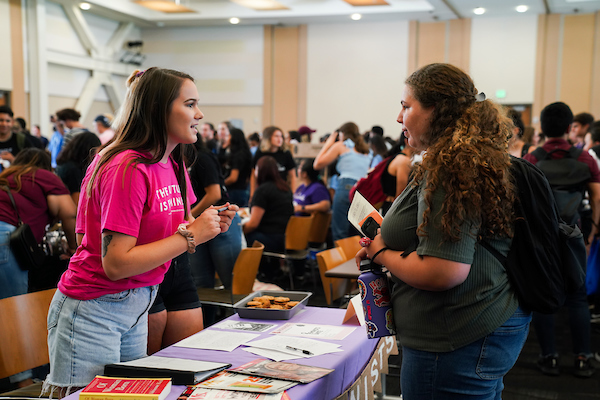 myCSUSM
myCSUSMStudent Resources
Frequently Asked Questions
- What can I do with a degree in Sociology?An undergraduate degree in sociology may lead to careers in advertising and market research, public-opinion polling, law enforcement and criminal justice, city planning, real estate, social work, community relations, and a variety of other occupations in the public and private sectors. In order to facilitate the understanding of how sociology can be applied in real social organizations, students are encouraged to take an internship in an organization or agency serving the community or in a social research setting. Our graduates are also prepared to continue the study of sociology at the graduate level for careers in human service, research, or teaching.
Here are some careers that a Sociology major may enter:
- Administration: Sociologists in leadership roles help define policies toward in government and public agencies. By leading teams of researchers and human services workers, sociologists can reshape their communities.
- Business: Sociologists research consumer trends and work with market researchers to discover new opportunities to meet the public's needs. Some corporations employ sociologists to impact the social effects of major projects like plant relocations or store openings. Sociologists also help product designers understand the overall trends shaping consumer culture in order to inspire tomorrow's hot new products.
- Counseling: Some counselors and therapists study sociology in order to better understand some of the larger trends they see among patients. By using sociological understandings of the causes of “personal troubles,” counselors can focus their practices on critical needs in their communities.
- Education: An emphasis in Sociology enable teaching in the social sciences at the high school level. Ph.D. level graduates may pursue careers at the college and university level.
- Journalism: Newspapers and local broadcast news outlets employ sociologists to help understand the kinds of stories that engage readers, viewers, and listeners in a particular region. Sociologists work with editors and market researchers to identify the right balance of news that audience members expect with the stories that need to be reported to uphold civic responsibilities.
- Politics: Campaign managers hire sociologists to identify critical neighborhoods that can make or break an election. By understanding the traditional voting patterns of key districts along with the crucial issues that concern voters, campaigners can deploy volunteers and activists to win over voters. Sociologists analyze patterns that affect the political and economic balance of the county. Sociologists can also help lawmakers predict the success or failure of proposed legislation based on voting patterns and current research findings.
- Public Relations: By reviewing market research data and understanding historic trends, sociologists can anticipate challenges when rolling out new products or building infrastructure.
- Research: Sociologists serve as independent research consultants who examine trends in human behavior for a variety of clients.
- Senior Services: Numerous outreach organizations and government agencies are hiring sociologists to study the effects of an again population on our culture. Sociologists predict the opportunities for future generations to thrive in a country with far fewer residents.
- Youth Services: Sociologists work in a variety of government agencies and nonprofit institutions to monitor the impact of policies and parental habits on today's young people. Sociologists examine the challenges that young people face when interacting with people of other generations. They also examine the significant cultural shifts driven by young people's tastes in popular culture.Community Organizing and Advocacy: Sociologists play an important role in non-profit organizations and advocacy agencies in organizing and advocating for social change on behalf of disadvantaged groups in society.
Adapted from: World Wide Learn - What can I do with a degree in Criminology and Justice Studies?
Interested in justice, law, and social change? The focus of the Criminology & Justice Studies Program is not one of criminal justice concerns, but rather, one concerned with creating a more just society. Students learn to critically assess the obstacles and opportunities central to the pursuit of justice. A major in Criminology & Justice Studies at CSUSM provides academic training for those interested in the following careers:
- Social Advocacy: Social advocacy in economic, legal, political, and cultural realms that include inequality in law and law enforcement, civil and human rights, and victim advocacy.
- Public Policy: Majors have options in career fields that conduct research, advocate, evaluate, and set public policy agendas.
- Law: Majors may consider going on to public interest-oriented law degrees or graduate degrees that focus on justice concerns in society.
- Research: Local governments hire Criminology and Justice Studies majors to understand the impact of tougher laws on neighborhoods as well as to help corrections officials determine the effects of new programs and regulations on the prison population.
- Investigations: Criminology and Justice Studies majors may help law enforcement officials anticipate crime by identifying obscure patterns.
- Corrections: Criminology and Justice Studies majors may work as a police or probation officers with offenders in the community or in an institutional setting.
- Social Services: Majors provide services to victims of crime by helping prepare them for court or by providing other supports to them in the community; they may support inmates upon their release from prison; and they may become involved in community-based alternatives to the criminal justice system.
- I'm intertested in graduate school. What do I do to prepare?
Undergraduate students, particularly those from groups underrepresented in higher education, who are interested in graduate school may apply to a variety of “summer research programs” that offer insights into graduate training and research. Students who get admitted to the summer research programs generally engage in a 6-8 week residential program at a host university in the U.S., and participate in small-group research methods classes, work on research projects with professors one-on-one, prepare for GRE exams and graduate school applications, and make research presentations.
Housing, a small stipend, and other resources are also generally part of these programs during the length of the summer program. Most programs prefer students who have at least a year left of undergraduate study. Applications due dates vary. Students can find information on these opportunities by doing an internet keyword search “undergraduate summer research program,” and sociology, criminology, justice studies, or other related discipline. Talk to your professors of your interest and/or contact our MASP Coordinators:
Dr. Richelle Swan (Summer 2023)
Professor, Department of Sociology
Graduate Coordinator for MASP
Office: SBSB 4218
Telephone: 760-750-4633
rswan@csusm.eduDr. Sheri-Lynn Kurisu (Incoming Grad Coordinator Fall 2023)
Assistant Professor, Department of Sociology
Graduate Coordinator for MASP
Office: SBSB 4212
Telephone: (760) 750-8233
skurisu@csusm.eduDr. Lori Walkington (Incoming Grad Coordinator Fall 2023)
Assistant Professor, Department of Sociology
Graduate Coordinator for MASP
Office: SBSB 4214
Telephone: (760) 750-8234
lwalking@csusm.eduBelow are links to information on a few of these programs:
- REU Sites: Social, Behavioral, and Economic Sciences
- REU - For Students
- SURF - Summer Undergraduate Research Fellowship
- The National Institutes of Health (NIH) Undergraduate Scholarship Program (UGSP)
- Summer Research - Early Identification Program (SR-EIP)
- Summer Research Opportunities in NSF-SBES Schools
- I don't know what class to take? I have questions about my major.
If you have questions about your major, course selection, degree requriments etc, you can contact your faculty advisor. All students are assigned to an advisor by the first letter of their last name. To find out who your specific advisor is check out Faculty Advising.
For all other questions reach out to Academic Advising Services
- I'm majoring in Sociology. Can I get my master's in Social Work?
Sociology will definitely prepare you for MSW (Masters in Social Work). In fact, you can specify your major to be focused on Children, Youth & Family or Health within specific concentrations in our major. Check out the worksheets here -- download the ones that seem interesting to you: Major and Minor Worksheets
The other thing that will help with preparing for graduate school in social work is gaining experience through service learning or internships. We are in a bit of a "pause" because of the pandemic but there are still some places doing virtual internships. Soc 495 is the internships class you will take as a senior. But for now, you are always welcome to check out the Office Of Internships & Service Learning resources to see if there are volunteer opportunities for you to explore: Office of Internships and Service Learning
Another strategy is while you take the regular sociology classes, focus your paper topics on issues you care about in social work.
Also, something I loved doing as an undergraduate is skimming the scholarly articles about the areas that interest me. There are really great journals out there and you can see which are the most read articles, the most cited, and also browse the specific issues. Check out these:
Journal of Social Work Practice
Professional Magazine: Social Work Today
You can access them with your CSUSM credentials and through our library. See this link to chat with a librarian to help you navigate this access: CSUSM Library
Finally, there is a social work association and you can join even as a student! Check out this information for the regional and national associations, their membership process, and activities:
National: National Association of Social Workers
State Association: Find a Chapter
Additional Associations: SocialWork.Org
Hope this gives you a few avenues to explore!
- Can I become a teacher with a SOC or CJS degree?
Yes! You can be a SOC or CJS major and still apply for the CSUSM Teaching Credential Programs. You will need to take the following classes before you apply: EDUC 350, 364, 422. Do these before you graduate. Or, if you have already graduated, you can take EDUC 350 at MiraCosta College and the other two courses through Extended Learning.
Check out these other resources!
Recording of Major Mondays - CSUSM Teacher Programs and Resources
(Zoom recording coming soon!)
CSUSM student club for future teachers: Future Educators Association
Project REACH – Supporting Latinx students to the teacher credential program
David Espinoza despinoza@csusm.edu
Maria Chiem mchiem@csusm.edu
General assistance with the application: Credential Programs
Other Student Resources

Major and Minor Worksheets
Sociology
Criminology & Justice Studies
To change your major/minor, go to your Student Center in my.csusm.edu. Locate ‘Change Major/Minor’ in the drop-down menu. Follow the prompts to choose your major and/or minor.
Professional Associations
Data and Other Resources









